|

|
|
|
|
BREED DESCRIPTIONS AND ADVICE
FOREWORD
So you've decided to share your life
with a Saluki. Congratulations! You've chosen probably the oldest
breed in the world, the Eastern sighthound that has been the hunting
companion of its peoples for millenia. Qashani Saluqis are direct descendants of these wonderful hounds,
endevouring to carry the torch into the future. The hope is to breed
Saluqis that look and function like their cousins in the the many
countries of origin, Saluqis that Tutankhamun, Moses, Alexander
the Great and Saladin might recognize.
Qashani Saluqis descend from these
legendary sighthounds, but their close blood relatives also still
hunt in the same rugged terrains. They are hounds that bring meat
to their masters' tables and that are praised in Arabian poetry through
the centuries. They were called Drinkers of the Wind and were said
to hunt their prey to the stars and beyond. The 7th century poet Abu
Nuwas wrote beautiful lines about this timeless breed, companion to
the poorest of Bedouins and the richest of princes - the brave Saluqi
with a tail like that of the brown scorpion, ears like the petas of
the purple iris, a hound without equal - lightning in a cloud.
|
|
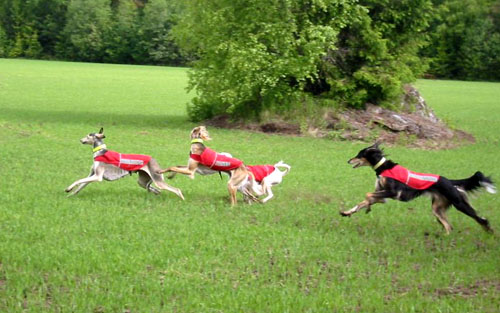
|
|
EXERCISING THE ADULT SALUKI
The Saluki naturally needs plenty of
good exercise, but it need not overwhelm the owner. Best of all is
naturally free running when especially the young Saluki will run for
the pure joy of it. A Saluki cannot be allowed off the leash just
anywhere though. It is very fast and will cover a mile in the blink
of an eye, and any movement in the distance can trigger its prey drive
and prompt it to give chase. It is independent and stubborn and though
it may have obeyed previously in a similar situation, in may not do
so every time, so it is imperitive that any running place be carefully
chosen, far from traffic.
|
|
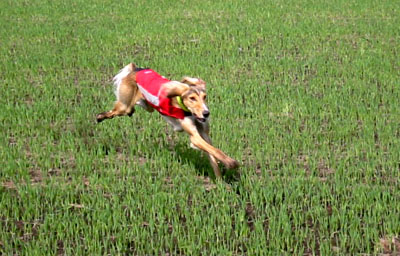
|
|
Dog parks are a good option for the city dweller, and
are good not only for exercise but also socializing the puppy and getting
it used to other breeds early on lest it become a bit of a racist. In small parks though keep a close eye on your Saluki as the fences are
usually not very high and your Saluki may decide to jump them if it
deems the park too boring. Once they realize they can get over a fence
it can be quite tricky trying to persuade them not to jump it all the
time. Not all Salukis enjoy dog parks however, and are more likely to
enjoy running in woods, fields and sand quarries.
My first saluki Akasha and I used to visit the abandoned race track
in Kilo and Akasha soon took to jumping over the fence to chase skiers
and bikers, even teaching her young Borzoi pal the same trick. Sometimes
a change of venue will help, at least until they jump that fence too...
Unfortunately the high jump proved fatal to Akasha when she jumped straight
into oncoming Christmas traffic...
If a you have a yard of your own, unless it is very isolated, it should
be carefully enclosed with a fence at least 150 cm high, though I know
several Salukis who jump 2 meter fences with no problems. If your yard
is sufficently large daily walks of about an hour on lead or in a safe
place makes for sufficent exercise, though more is of course better!
For a Saluki living in an apartment daily outings should entail at least
one 1½-2-hour walk and 2-3 half-hour walks.
If these are on a lead the Saluki will nonetheless need to run properly
a minimum of three times a week, preferably more. In between competition
or hard runs it's good to take a day off here and there to recuperate.
The important thing is to learn to read your dog and what it needs.
more about this in the training manual attached to the puppy package.
|
|
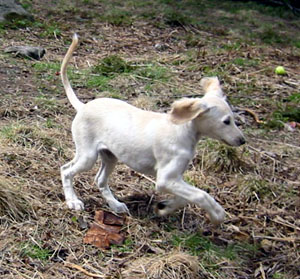
|
|
PUPPY EXERCISE
Naturally every precaution should be
taken prior to suitable vaccinations, but it is also important to
begin your puppy's socialization early on, letting it meet different
people and dogs (preferably dogs you know and can be sure have been
inoculated) and taking it to new and strange places. Puppies are exercised
on their own terms, keeping a close eye so they don't tire themselves
too much yet being sure not to overprotect them. If lead walked several
short walks are in order. An energetic puppy will usually walk beside
you or ahead of you, while a tired puppy will sit or lag behind.
If you have a yard of your own the
puppy can regulate its exercise and decide for itself when it's had
enough. In such cases excursions beyond the yard are more exploratory
than anything else, beneficial for socialization. These kind of preparations
for life are of course vital for any breed of dog but perhaps especially
important for Salukis that are sensitive and quick to react. This
will prepare them for urban life as well as many hobbies you may wish
to participate in. Around 6 months of age your puppy will be ready
for gradually longer jaunts and around 1 year it can be exercised like an
adult.
|
|
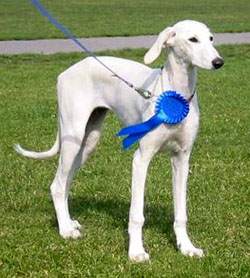
|
|
THE SALUKI IN SPORTS
The Saluki is very versatile and provided you can read and motivate
your dog you may be able to participate in almost any sport, particularly
if you aren't out to win. Open field coursing is ideal but available
to very few. Most of us are limited to artifical lures in lure-coursing
and racing, although not all Salukis will chase the artificial lure.
Always buy your dog as a pet first, with the activities a nice plus
if
possible. Some like shows, agility, obedience... I will enclose training
tips and contacts in the puppy package.
|
|
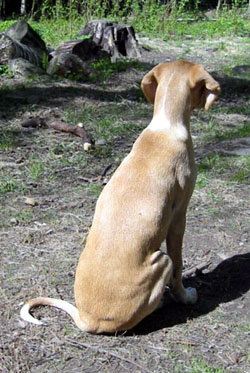
|
|
TEMPERAMENT
The Saluki is sensitive to its surroundings
and the moods of its owner. It is intelligent and a quick student,
so teaching it things is easy. Whether will it choose to display what
you've taught it any given time is another matter entirely ;) Certainly
nothing pleases it more than when the desires of itself and its owner
happen to coincide and it will rejoice in praise.
Losing your temper with a Saluki is
highly counterproductive and will only make matters worse. It is sensitive
to a certain "etiquette" and may lose faith in you, deciding to leave
you to cool down. In my experience COO (country of origin) Salukis are more co-operative,
more in tune with the owner and working as a team, no doubt due to
the breeding criteria aimed at working ability. Still, it is obviously
not a German Shepherd - different rules apply. It is important to
find the right way to motivat your dog. I use treats, though not all
my Salukis are nuts about them, but they consider it a fair trade
;)
Our Zia would bend over backwards for
a treat, Asheerah couldn't care less, unless she's inside or on lead.
She enjoys doing tricks for treats then, since she knows she can't
run and so has nothing better to do at the time ;) My desert Salukis
are more concerned with teamwork, but treats aren't half bad and will
prompt co-operation when it might otherwise be slow in coming. They
are more responsive and like to do things TOGETHER with me, rather
than IN THE GENERAL VICINITY OF ME, hich is usually the case with
my Western Salukis ;)
Salukis can be demanding and nerveracking
at times and is not suitable for a person who expects instant and
complete servitude. It can at times inflate your ego in its willfullness
;) On the other hand it is faithful and bonds closely with its owner
if he or she can handle it correctly. There is a Syrian poem which
loosely paraphrased tells of a woman who says she wants no lazy glutton
for a man who will cling to her like a Saluqi... This doesn't mean
that you will constantly be tripping over your Saluki while it trips
over itself trying to please you... far from it. It is loving but
independent and is content knowing that you are around while it minds
its own business. This is in fact one of its redeeming qualities.
|
|
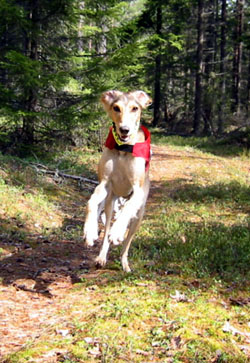
|
|
Although the Saluki will be affectionate to all in your household
it usually chooses one particular person as its master/mistress. Usually
the one in charge of caring for it. It has a charming way of approaching
you, head tilted to one side, a paw offered demurely. Of course there
are those, like my Asheerah, who sometimes prefer a more direct approach:
jumping on my back, and when I turn there she is, rump in the air,
inviting me tp play. Or there's Lublub's cannonball approach: a swift
attack to my midriff knocking the wind out of me, followed by lots
of kisses while she smiles broadly and squints at me. Both like making
people laugh. The saluki is a study in contradictions: wild outside,
calm inside, faithful but not servile, proud but hunorous, intelligent
but selfserving, elegant yet strong.
Although most Salukis remain playful
and willing to run into their golden years, some may tend toward being
couch potatoes in their old age, preferring comfort before sport.
A doggy friend will usually help light the spark in your oldie. Any
breed will do, though Salukis prefer the company of likeminded souls,
and of course other Salukis are best of all. Living with two or more
Salukis is usually easy to keep since they are inconspicuous indoors
and exercise each other outdoors. As long as they get plenty of exercise
your apartment or house need not be big, Salukis fit snugly into smaller
rooms once they've blown off some steam.
|
|

|
|
SALUKI VICES
The young Saluki can get up to a lot of mischief both in- and outdoors.
It has an unending supply of energy which, if allowed, it will gladly
expend on making firewood of your furniture. This breed is not a wise choice
if you just want to adorn your living room with it. Chances are it will
have its own ideas about the decor.
I confess our Salukis all did their bit to remodel my old cottage:
Akasha removed the stuffing from the sofa, Zia cleaned out the pantry,
Asheerah rounded any sharp-edged furniture and gave the window sill
a quaint worn look, Farha ate the dining room chairs, Muhafhaf peeled
the wallpaper in the kitchen and Lublub has done her bit to refine each
of the previous
efforts, as has Habwa. Basma has specialised in
shredding paper towels. All will demolish mattresses
in efforts to get comfy. Zia was a food thief, as many Salukis are.
It could be that you Saluki will leave the Sunday roast untouched when
you answer the phone. Then again, why take the chance?
A Saluki may also protest bad treatment by tearing up the house or peeing
indoors. A firm yet gentle hand, patience and understanding and lots
of exercise make a peaceful
Saluki home. It pays to make the effort to reach a mutual understanding
based on respect and love rather than intimidation and fear. The latter
is sure to ruin a good Saluki.
|
|
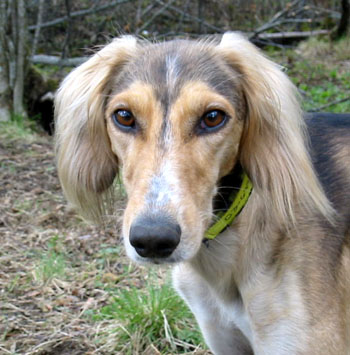
|
|
HEALTH
Compared to many other breeds the Saluki is quite healthy, but it does
have its problems which unfortunately seem to be on the increase. The
biggest threat to the breed are the family of auto-immune diseases where
the dog's immune system is severely impaired and attacking itself. The
most feared of these diseases are the blood-realated thrombocytopenia
and AIHA (auto-immune hemolytic anemia). These and other related problems
seem to exist in the breed as a whole but certain families seem particularly
stricken, and in- and line-breeding can only worsen the situation.
According to the health survey conducted by the Finnish Saluki Club in
2004, the most prevalent health problems in Salukis are autoimmune
diseases, heart problems, allergies and cancers, with an incidence of
about 6-7%.
One reason for my importing desert Salukis is the health issue and the
decreased vitality in Western hounds. I sincerely hope that breeders will dare to utilize
the outcross potential of these imports and thereby hopefully counteract diseases
that thrive on narrow gene pools. Desert Salukis have survived
in very harsh conditions for generations and the sick and inept have
fallen by the wayside. Only healthy and functional hunds have been allowed
to propagate.
This does not mean that they do not carry deletrious genes just like
all other living creatures, or that they are impervious to disease, but
it is certainly a more effective safeguard against disease than we can
hope to duplicate and the hope is that continual use of country of origin
hounds will benefit the health situation in the lines that dare to take
the plunge. There are never any guarantees in organic populations, naturally,
but wider gene pools are a significant step in the right direction.
|
|

|
|
FEEDING
How you feed your Saluki is of course a very personal
decision, but I would prefer that they get at least
half home-cooked. My own are fed according to the
BARF-diet: 60 % consists of raw meaty bones and all
the other ingredients are fed raw as well, although I
do feed some cooked rice a few times a week. The dogs
get one meal a day, except for one day 2-3 times a month which is
for fasting. I will enclose details of this diet in
the puppy package, but here's roughly how my own dogs
eat - fresh water is naturally available at all times.
- Thrice a week the dogs get raw meaty bones, usually chicken wings
which are easily digestible and have the right meat-to-bone ratio (50/50).
Raw, unseasoned chicken wings can usually be ordered via local butchers
or grocers. The adults get 6-7 wings per meal. Sometimes they get other kinds of bones,
anything they can consume entirely, such as lamb ribs or chicken or turkey
carcasses, whatever.
|
|
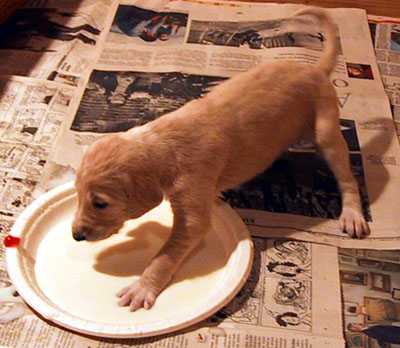
|
|
- Four times a week they get a "soft meal". This consists of 1/3 cooked rice,
1/3 raw meat/tripe/heart/liver etc. (it varies from day to day) and
1/3 a mix of fruits and vegetables with sour milk or goat's milk and
raw eggs with the shells, all mixed together in a blender and then
mixed with the meat and rice. Any vegetables and fruits can be used
except tomatoes, paprika and raisins/grapes, which can induce liver
failure in some dogs.
- Once or twice week the soft meal will contain raw salmon instead of meat. About once a month I give sea meal for a week as a
supplement, and daily I supplement with garlic, honey
and coldpressed vegetable oil. Sometimes they get
salmon oil as well. This is how we feed the pups from
8 weeks on. As babies, when they don't get enough
bones, I supplement with Citro-Oska (a vitamine and calcium supplement, but I
only in small doses) .
|
|
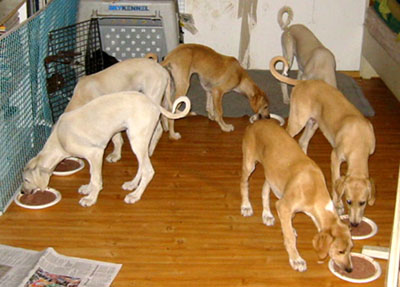
|
|
I have to admit that though we follow the BARF
principles (minus the masses of extra vitamins and
strict percentages some use), mostly I feed by feel,
looking at the individual dogs and how they grow and
thrive. The important thing with BARF is to vary the
ingredients as much as possible during the week so the
dogs get all the nutrients they need and to give meat
and bones raw so they get the enzymes they need. I
prefer it if dogs aren't fed solely on commercial
foods, as I believe they have much to answer for as
regards increased health problems. Still, if you do
use commercial foods, use high-quality foods with no
additives, based on real meat, and use brands meant
for ADULTS for pups as well.
|
|

|
|
There are of course other diets, such as the serial-based
ones (for example Yrjölä-porridge, I'll enclose a recipe in the puppy
package), but even then please add raw meat to the finished product
and supplement with Cirto-Oska or better yet bones and/or egg shells,
including during the growth period, but with adult dosages. If you feed
half commercial and half home-cooked it's better not to supplement.
Heavily feathered Salukis can wear snoods to keep the ears out of the
feeding bowl. Feed your Saluki from a raised surface, a chair or bench
or something. A Saluki in good condition is lithe, strong and well-muscled
with a gleaming coat and only a couple of ribs barely showing.
The young pup eats four times a day,
at 4 months I feed twice a day. The pup may leave out a meal occasionally.
|
|
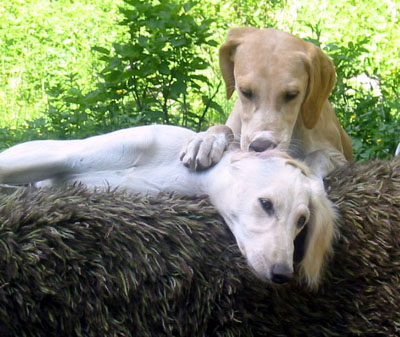
|
|
MANNERS
Teach your puppy to tolerate the grooming
process early on. Handle it every day and as you do examine its ears,
eyes, teeth, feet one toe at a time, brush it lightly. Now is a good
time to teach it to tolerate brushing the teeth if you like, although
chewing on raw bones is easier, healthy and more effective. If the
puppy squirms or screams just hold it gently but firmly, talk soothingly
and let it go when it has been calm in your grip for a while. And
keep practising! About once a week clip the nails if necessary, careful
not to cut to the quick.
Grooming the adult Saluki is a simple
process, comb through the feathering once a week and wash four times
a year or when dirty. Wash before shows too but if you show often
just wash the feathering so as not to dry the skin. The smooth Saluki
can be polished with chamois or a soft brush, I usually just brush
through them in the spring and autumn when they tend to shed.
|
|
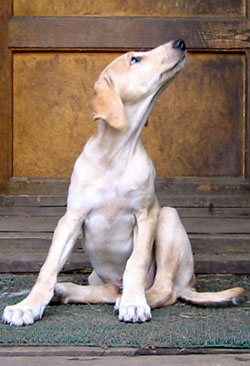
|
|
Besides the obvious grooming benefits these handling sessions will
deepen your relationship with your dog and will also facilitate trips
to the vet, shows, etc. ask guests to go through the pup as well:
handle it, look at its teeth etc. If you plan to show training can
begin now with lead walks and teaching the puppy to "stand" for a
moment every day. Lots of praise and treats!
|
|
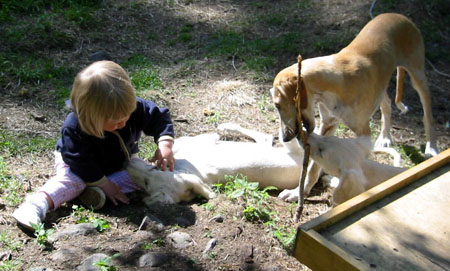
|
|
If you're interested in racing/coursing, start practising with a fur
on the end of a fishing line or fishing pole, pulling it for the puppy
and teasing it, encouraging it to chase the fur. Only a moment at
a time and stop while the pup thinks it's fun! I will enclose training
articles in the puppy package.
|
|

|
|
Now is a good time to teach your puppy basic good manners.
A Saluki puppy enjoys doing things with the owner and learns fast -
good things and bad! It's especially important to teach your puppy to
come when called. For example, at meal times, show the puppy the food
and tell it to "come". It will associate the command with goodies and
fun. It's a good idea to keep treats in your pockets at all times, so
that when the puppy comes, good things follow: treats, games, a cuddle,
whatever your pup enjoys the most. As they get older, sometimes I vary
the prize or just praise, just to keep things interesting for them.
Around 7-12 months of age they usually decide to test your authority
by ignoring your calls. Don't stay around holloring (again a reason
to choose secluded, safe places for runs), instead walk away ignoring
the pup but make sure he sees you leaving. When the pup looks YOU up,
praise it generously, give it a treat, and let it go. And repeat: call
it and if it doesn't come go over the same thing. It's important that
the puppy doesn't equate your calls with being leashed and scolded and/or
taken home. Naturally, sometimes it does mean being leashed, but not
every time!
|
|
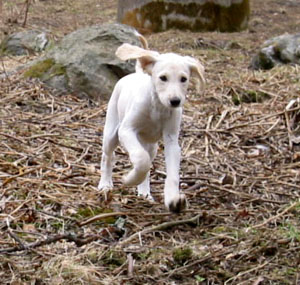
|
|
And always praise! Always use the same command for the same thing
and make sure others in the household use those commands as well,
to make sure the pup knows what you want it to do. At about 4 months
your pup will begin to change its milk teeth for the permanent ones.
Give him plenty of things to chew on lest he find ones you don't want
him to, and check that the teeth fall out and grow in as they should.
|
|

|
|
Housebreaking is another primary concern. Some learn this quickly,
others take their time. Much depends on the vigilance of the owner.
Don't scold the puppy for making a mistake, just a firm "no" and then
take the pup outside so it has a chance to get it right. When it does,
praise lavishly. Take the pup out often, particularly after sleeping,
eating and playing. If the pup is left for hours at a time leave a
newspaper for it near the door and show it how to go on that.
|
|
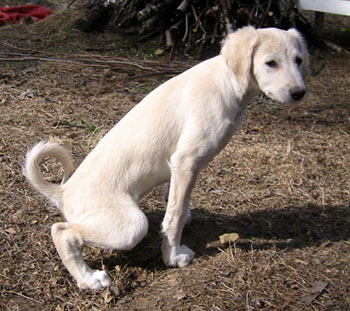
|
|
It is also important to teach the puppy to be left alone at home.
Otherwise it may take to redecorating or howling while you're away,
which might not delight your neighbors. So, teach the puppy to be
left at home, for very short periods at first, gradually increasing
the time. Praise it when it's been good! Soon it will realize that
though you may leave you will come back.
Physical punishment does not go down well with
Salukis. I use a spray bottle with a sharp spray of
water in their face, accompanied by a sharp NO, to
discipline them. This is very effective but needs to
be timed correctly.
Finally in the words of Abu Nuwas:
"May Allah allow my lord the prince to enjoy him long! May he continue
happy with his hound."
|
|
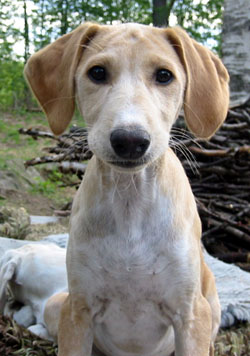
|
|
REMINDERS
PLEASE REMEMBER TO CALL OR WRITE, DAY OR NIGHT, IF YOU HAVE ANY QUESTIONS!
Tel. +358-(0)41-483 2630
E-mail qashani@gmail.com
LET ME KNOW HOW YOU ARE DOING, SEND ME PICTURES ETC. IF YOU CAN PLEASE
VISIT SOMETIME! IF THE DOG BECOMES ILL OR DIES OR YOU FOR SOME REASON
CANNOT KEEP IT ANY LONGER, PLEASE LET ME KNOW IMMEDIATELY SO I CAN HELP!
I WILL TAKE THE DOG OR REHOME IT IF NECESSARY! DON'T BE AFRAID TO SHARE
PROBLEMS OR JOYS, HOWEVER BIG OR SMALL!
QASHANI SALUQIS,
MICAELA LEHTONEN,
METSÄKULMANTIE 27,
14770 ETELÄINEN,
FINLAND
|



















